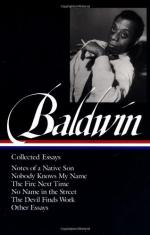
|
| Name: _________________________ | Period: ___________________ |
This test consists of 15 multiple choice questions and 5 short answer questions.
Multiple Choice Questions
1. What university were American soldiers attending in Paris?
(a) University of London.
(b) University of Paris.
(c) Cambridge.
(d) Sorbonne University.
2. In total, how many days did Baldwin spend in the French prison system?
(a) 6.
(b) 12.
(c) 10.
(d) 8.
3. What does Baldwin say must sustain the American Negro in the present?
(a) The European future.
(b) The American past that is disregarded in Europe.
(c) The European present.
(d) The African past that is disregarded in Europe.
4. How did the French see Baldwin in the commissariat?
(a) As an American.
(b) As a French Negro.
(c) As a French man.
(d) As an American Negro.
5. How does Baldwin describe the housing of all students living in the Latin Quarter?
(a) Medival-looking hotels.
(b) Dingy hotels.
(c) Hotels with classic architecture.
(d) Ageless, sinister-looking hotels.
6. Instead of discussing the past, what does Baldwin suggest the American Negro and Whites discuss while in Paris in the 1940s and 50s?
(a) Musicians.
(b) American politics.
(c) French politics.
(d) The Eiffel Tower.
7. Where does Baldwin stay while in Switzerland?
(a) A room in a church.
(b) A chalet.
(c) A tent.
(d) A hotel.
8. In the chapter, A Question of Identity, how does Baldwin learn about his struggle for identity in the world?
(a) By observing others and examining his own growth.
(b) By speaking with Parisians.
(c) By studying at a Parisian University.
(d) By observing the lifestyle of the French African.
9. According to Baldwin, where does the family lineage of any black man in America stop?
(a) Africa.
(b) The slave trade.
(c) Emancipation.
(d) Colonization.
10. What do the children call Baldwin when he first arrives in the Swiss village?
(a) Neger.
(b) Negro.
(c) Poor man.
(d) Black man.
11. Who traveled with Baldwin to visit his dying father on Long Island?
(a) Baldwin's friend.
(b) Baldwin's brother.
(c) Baldwin's mother.
(d) Baldwin's aunt.
12. Who were the only white people that visited Baldwin's childhood home?
(a) Welfare workers and police officers.
(b) Welfare workers and bill collectors.
(c) Bill Collectors and police officers.
(d) Welfare workers and teachers.
13. Approximately how many people live in the Swiss village that Baldwin visits?
(a) 400.
(b) 800.
(c) 1000.
(d) 600.
14. How does Baldwin describe the lives of the nonperforming Negroes in Paris as compared to the lives of Negro entertainers in the 1940s and 50s?
(a) Exciting.
(b) Boring.
(c) Isolated.
(d) Deprived.
15. Whose records did Baldwin's father forbid his children to play?
(a) The Melodeers.
(b) Louis Armstrong.
(c) James Brown.
(d) The Golden Gate Quartet.
Short Answer Questions
1. Which group did Baldwin mention as living together in groups - in the same neighborhoods and student hotels - while in Paris in the 1940s and 50s?
2. In what year was Baldwin arrested in Paris?
3. What reason does Baldwin give for not believing that ex-GIs traveled to Paris to study?
4. According to Baldwin, how did an American Negro view another American Negro in Paris during the 1940s and 50s?
5. According to Baldwin, what does the black man in American struggle to find?
|
This section contains 514 words (approx. 2 pages at 300 words per page) |

|




